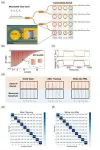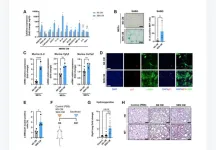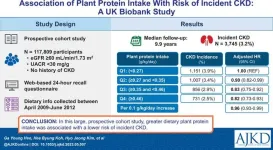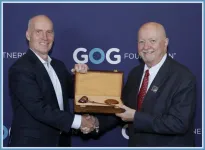(Press-News.org) Technological advancements like autonomous driving and computer vision are driving a surge in demand for computational power. Optical computing, with its high throughput, energy efficiency, and low latency, has garnered considerable attention from academia and industry. However, current optical computing chips face limitations in power consumption and size, which hinders the scalability of optical computing networks.
Thanks to the rise of nonvolatile integrated photonics, optical computing devices can achieve in-memory computing while operating with zero static power consumption. Phase-change materials (PCMs) have emerged as promising candidates for achieving photonic memory and nonvolatile neuromorphic photonic chips. PCMs offer high refractive index contrast between different states and reversible transitions, making them ideal for large-scale nonvolatile optical computing chips.
While the promise of nonvolatile integrated optical computing chips is tantalizing, it comes with its share of challenges. The need for frequent and rapid switching, essential for online training, is a hurdle that researchers are determined to overcome. Forging a path towards quick and efficient training is a vital step on the journey to unleash the full potential of photonic computing chips.
Recently, researchers from Zhejiang University, Westlake University, and the Institute of Microelectronics of the Chinese Academy of Sciences achieved a breakthrough. As reported in Advanced Photonics, they developed a 5-bit photonic memory capable of fast volatile modulation and proposed a solution for a nonvolatile photonic network supporting rapid training. This was made possible by integrating the low-loss PCM antimonite (Sb2S3) into a silicon photonic platform.
The photonic memory utilizes the carrier dispersion effect of a PIN diode to achieve volatile modulation with a rapid response time of under 40 nanoseconds, preserving the stored weight information. After training, the photonic memory utilizes the PIN diode as a microheater to enable multilevel and reversible phase changes of Sb2S3, allowing the storage of trained weights in the photonic computing network. This leads to an incredibly energy-efficient photonic computing process.
Using the demonstrated photonic memory and working principle, the research team simulated an optical convolutional kernel architecture. Remarkably, they achieved over 95 percent accuracy in recognizing the MNIST dataset, showcasing the feasibility of fast training through volatile modulation and weight storage through 5-bit nonvolatile modulation.
This groundbreaking work establishes a new paradigm for photonic memory and offers a promising solution for implementing nonvolatile devices in fast-training optical neural networks. With these advancements, the future of optical computing looks brighter than ever before.
Read the Gold Open Access article by M. Wei et al., “Electrically programmable phase-change photonic memory for optical neural networks with nanoseconds in situ training capability,” Adv. Photon. 5(4) 046004 (2023), doi 10.1117/1.AP.5.4.046004.
END
Harnessing the power of light: Advancements in photonic memory for faster optical computing
In a breakthrough for optical computing, researchers developed a nanosecond-scale volatile modulation scheme integrating a phase-change material
2023-07-31
ELSE PRESS RELEASES FROM THIS DATE:
Study raises possibility of immunotherapy treatment for ALS
2023-07-31
New research reveals a type of monoclonal antibody already tested in certain forms of cancer may be a promising treatment in stopping the progression of amyotrophic lateral sclerosis, or ALS, a fatal neurodegenerative disease.
The study, led by scientists at Oregon Health & Science University, published today in the Proceedings of the National Academy of Sciences.
The study, involving a mouse model and confirmed in the tissue of human brains affected by ALS and donated after death, revealed for the first time that modulating immune cells can slow the progression of the disease. Previous research suggested a role for immune cells in ALS, but researchers this time used a high-throughput ...
Multi-level international study explores anxiety, concerns of families with a child with a neurodevelopmental condition during the COVID-19 pandemic
2023-07-31
A peer-reviewed study published in the Journal of Global Health analyzed data from more than 6,600 families with a child with a neurodevelopmental condition (NDC)—autism, attention-deficit/hyperactivity disorder, developmental language disorder, Down syndrome, Williams syndrome, and intellectual disability—from 70 countries, including the United States.
The study was led by Andrea Samson, associate professor of psychology at UniDistance Suisse and University of Fribourg, Switzerland, and Jo Van Herwegen, professor in developmental psychology and education at University College London’s ...
Human senescent fibroblasts cause lung fibrosis in mice
2023-07-31
“These observations support that accumulation of senescent cells may contribute to fibrotic lung disease [...]”
BUFFALO, NY- July 31, 2023 – A new research paper was published on the cover of Aging (listed by MEDLINE/PubMed as "Aging (Albany NY)" and "Aging-US" by Web of Science) Volume 15, Issue 14, entitled, “Human senescent fibroblasts trigger progressive lung fibrosis in mice.”
Cell senescence has recently emerged as a potentially relevant pathogenic mechanism in fibrosing interstitial lung diseases (f-ILDs), particularly in idiopathic pulmonary fibrosis. In a new study, researchers Fernanda Hernandez-Gonzalez, ...
Plant-based protein intake may reduce kidney disease risk
2023-07-31
Plant-based diets confer various health benefits, including lowering the risk of cardiovascular disease and certain cancers. However, the relationship between plant protein intake and the risk of chronic kidney disease (CKD) remains unclear. This study led by Ga Young Heo aimed to investigate the association between plant protein intake and the development of CKD. Using the UK biobank study data, the researchers found that participants with a higher plant protein intake had a lower risk of developing CKD. This finding suggests that a higher dietary intake of plant-based protein may be beneficial for kidney health and provide insight into ...
Researchers identify two new subtypes of HPV-associated head and neck cancers
2023-07-31
CHAPEL HILL, N.C. – Cases of human papillomavirus (HPV)-associated cancers of the head and neck, known as head and neck squamous cell carcinoma (HNSCC), are rapidly increasing throughout the United States. Unfortunately, relatively little is known about the factors that contribute to these tumors and what makes some tumors more aggressive and treatment-resistant than others.
To determine why some patients respond better to radiation therapy than others, researchers in UNC School of Medicine’s Department of Otolaryngology/Head and Neck ...
Endocrine Society and Matchbox Virtual Media announce joint venture
2023-07-31
WASHINGTON—The Endocrine Society and Matchbox Virtual Media are pleased to announce today that the organizations formed a joint venture that will bring exciting new opportunities for medical, healthcare, and scientific associations to better customize the experiences of their customers relative to producing meetings, organizing communities, and disseminating educational products.
The new joint venture will benefit from the Endocrine Society’s initial financial investments and its robust networking within the medical and scientific fields. Matchbox Virtual Media brings its proven platform, technologies, ...
Scientist who expands chemists’ tools joins The Wertheim UF Scripps Institute
2023-07-31
JUPITER, Fla. — A new scientist joining The Herbert Wertheim UF Scripps Institute for Biomedical Innovation & Technology invents creative and efficient ways to build complex, potentially useful molecules, studying their activity so that compounds found in nature may eventually become useful products, such as medications.
Synthetic chemist and associate professor Masayuki Wasa, Ph.D., joins the institute from Boston College, where he was an assistant professor of chemistry. Synthetic chemists specialize in assembling larger molecules from smaller parts, like a child assembling a Lego spaceship from a basket of oddly shaped pieces.
But the work is far from child’s ...
Thomas J. Herzog, MD takes office as The GOG Foundation, Inc. President
2023-07-31
At the NRG Oncology Summer Meeting on Thursday, July 20, 2023, at approximately 5:44pm EDT, Larry J. Copeland, MD passed the presidential gavel to Thomas J. Herzog, MD at The GOG Foundation, Inc. (GOG-F) Board of Directors meeting.
Dr. Herzog brings a comprehensive background in clinical trials, the integral business aspects and acumen to this important position. A practicing gynecologic oncologist and member of the Board of Directors of GOG-F, he has served as the Treasurer of GOG-F from 2014-2023 and prior ...
ACP issues updated guidance for colorectal cancer screening of asymptomatic adults
2023-07-31
Embargoed for release until 5:00 p.m. ET on Monday 31 July 2023
Annals of Internal Medicine Tip Sheet
@Annalsofim
Below please find summaries of new articles that will be published in the next issue of Annals of Internal Medicine. The summaries are not intended to substitute for the full articles as a source of information. This information is under strict embargo and by taking it into possession, media representatives are committing to the terms of the embargo not only on their own behalf, but also on behalf ...
Why you shouldn’t declaw tigers or other big cats
2023-07-31
Declawing house cats to keep them from scratching people and furniture is controversial – and even banned in some countries and areas in the U.S. – but the practice is not limited to house cats. In a new study, researchers looked at the effects of declawing on larger cat species and found that declawing disproportionately impacts their muscular capabilities as compared to their smaller brethren.
While it is illegal in the U.S. to surgically modify an exotic animal, declawing is still done on large cats like lions and tigers, often in an effort to allow cubs to more safely ...
LAST 30 PRESS RELEASES:
A kaleidoscope of cosmic collisions: the new catalogue of gravitational signals from LIGO, Virgo and KAGRA
New catalog more than doubles the number of gravitational-wave detections made by LIGO, Virgo, and KAGRA observatories
Antifibrotic drug shows promise for premature ovarian insufficiency
Altered copper metabolism is a crucial factor in inflammatory bone diseases
Real-time imaging of microplastics in the body improves understanding of health risks
Reconstructing the world’s ant diversity in 3D
UMD entomologist helps bring the world’s ant diversity to life in 3D imagery
ESA’s Mars orbiters watch solar superstorm hit the Red Planet
The secret lives of catalysts: How microscopic networks power reactions
Molecular ‘catapult’ fires electrons at the limits of physics
Researcher finds evidence supporting sucrose can help manage painful procedures in infants
New study identifies key factors supporting indigenous well-being
Bureaucracy Index 2026: Business sector hit hardest
ECMWF’s portable global forecasting model OpenIFS now available for all
Yale study challenges notion that aging means decline, finds many older adults improve over time
Korean researchers enable early detection of brain disorders with a single drop of saliva!
Swipe right, but safer
Duke-NUS scientists identify more effective way to detect poultry viruses in live markets
Low-intensity treadmill exercise preconditioning mitigates post-stroke injury in mouse models
How moss helped solve a grave-robbing mystery
How much sleep do teens get? Six-seven hours.
Patients regain weight rapidly after stopping weight loss drugs – but still keep off a quarter of weight lost
GLP-1 diabetes drugs linked to reduced risk of addiction and substance-related death
Councils face industry legal threats for campaigns warning against wood burning stoves
GLP-1 medications get at the heart of addiction: study
Global trauma study highlights shared learning as interest in whole blood resurges
Almost a third of Gen Z men agree a wife should obey her husband
Trapping light on thermal photodetectors shatters speed records
New review highlights the future of tubular solid oxide fuel cells for clean energy systems
Pig farm ammonia pollution may indirectly accelerate climate warming, new study finds
[Press-News.org] Harnessing the power of light: Advancements in photonic memory for faster optical computingIn a breakthrough for optical computing, researchers developed a nanosecond-scale volatile modulation scheme integrating a phase-change material






